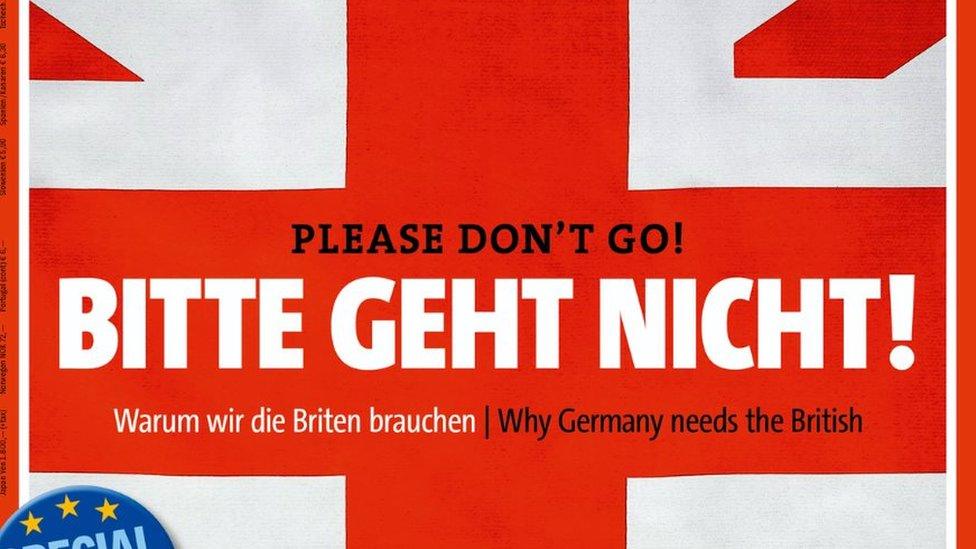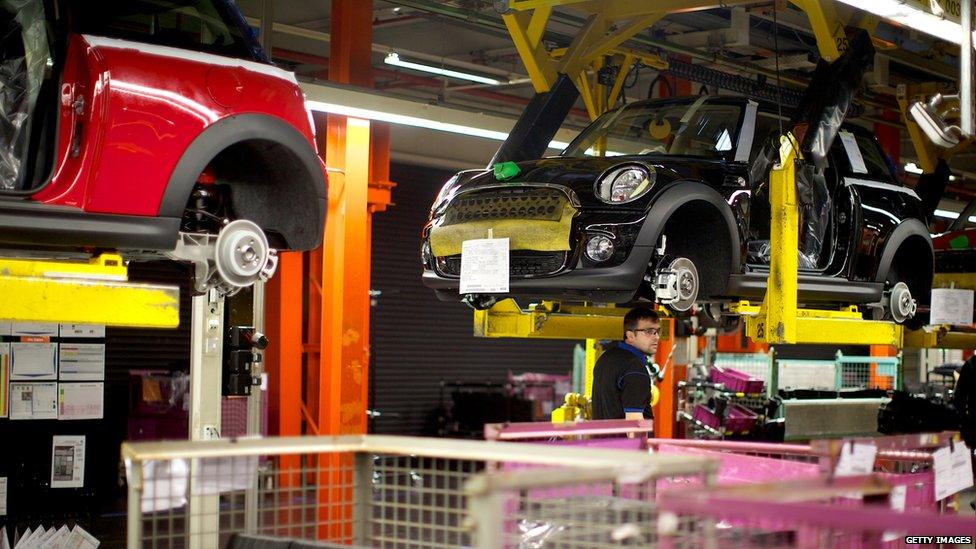'Please don't go' - The German message to Britain on the EU referendum
- Published

If you were ever in any doubt about how Germany feels about the EU, just head to its national parliament.
On one corner of the enormous Reichstag building flies the blue and yellow of the EU flag. You wouldn't find that at Westminster.
"The EU flag is such an impressive sign that is spread all over Berlin," explains 20-year-old Niklas Sannowitz, a student who lives in the city.
"It symbolises unity and freedom."

The front page of this week's Der Spiegel, a German weekly news magazine
For many Germans like Niklas the idea of the European Union losing one of its key members is hard to imagine.
"I'm afraid. I'm really afraid of Britain leaving. I worry about the future and what it would mean for the other countries," he says.
His anxiety is reflected in the views of many other Germans, British ex-pats and senior business figures in Berlin.
'Please stay'
Hendrik Nahr, 24, is too young to remember anything but times of peace and prosperity for his country but the memories of darker times are littered across Berlin.
There are various memorials to commemorate World War One and Two. Giant concrete slabs are also dotted across the city - a reminder of the Berlin Wall that used to divide this country in to East and West Germany during the Cold War.

Tourists in Berlin visit one of the sites of the remains of the Berlin Wall
Hendrik believes the EU is partly responsible for the peace that he has known in his lifetime.
His message to British voter is simple.
"Please stay. The European Union helps keep peace and co-operation all over Europe and if Britain leaves I feel like this stability would not be guaranteed any more."

Hendrik Nahr, 24, believes the UK remaining in the EU is important for peace in Europe
"Leaving the EU would be the first step towards less co-operation. I think the UK is a strong player in the European Union even if they don't see it sometimes."
While some, like Hendrik, worry about future peace on the continent, others are more concerned about future travel plans.
"The EU makes it easy to travel to so many countries without worrying about paperwork. I love Britain and I want to travel there and for it to be as easy as possible," says Lina Masters, another student in Berlin.
It's unlikely that Britain leaving the EU would make life too difficult for Lina if she wanted to visit but there concerns are that changes to freedom of movement that comes with being an EU member could make life harder for thousands of Brits living and working in Berlin.

Lina Masters is worried about how easy it will be to travel to the UK if it leaves the EU
Liam Nolan is from Oxfordshire but is now celebrating six years in Berlin working in the music industry.
As an EU citizen, he is free to move to any of the 28 member countries to live and work.
"I've never given it a second thought. It's just so easy and we're in such a privileged position.
"It wouldn't be as easy to go and live in America and I've got no idea how difficult it would be for people like me if the UK votes to leave."

Liam Nolan has lived in Berlin for six years
If Britain does choose to leave the EU, the ability of people to live and work abroad would depend on new agreements the UK negotiates with other countries.
'Like a star leaving the team'
Another uncertainty involves the relationship between Britain and Germany when it comes to trade.
Dr Markus Kerber runs the German Federation of Industries, a network of approximately 100,000 industrial companies.
"Britain is our second biggest trading partner. We're probably not closer to anyone else but Britain," he says.
"It would be a like a super football star leaving the team if Britain leaves."
He worries it would mean thousands of contracts would have to be re-negotiated, causing problems for both Germany and the UK.

The Mini car plant in Oxfordshire, owned by German company BMW
He uses the example of Mini, which is owned by German company BMW, but made in the UK.
"I'm sure that hundreds of Britons involved in producing that car regularly travel and get trained in Germany. All that would become a little more difficult."
He adds that the extra "difficulties" may not seem so bad but will be a "drag on everyday lives".
"I'm not sure whether BMW would see that as an incentive to invest more in that company. Investing more would mean more jobs in Britain."
Find us on Instagram at BBCNewsbeat, external and follow us on Snapchat, search for bbc_newsbeat